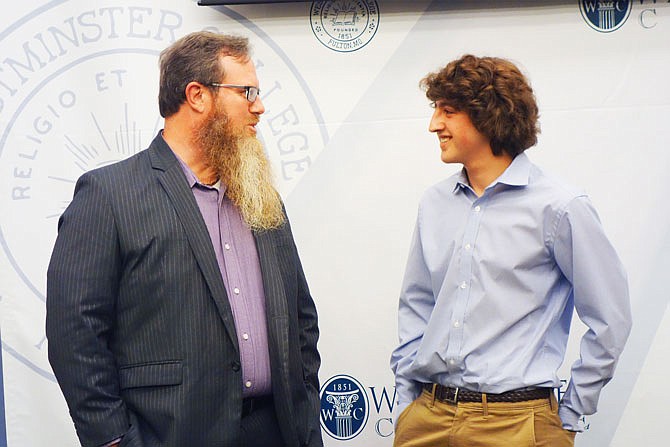A reporter never wants to be the story, political journalist Gabe Fleisher said.
But with someone like Fleisher, it's hard to resist the temptation. The 16-year-old St. Louis resident writes a daily email newsletter that has amassed some 50,000 followers.
"The fact that I am a 16-year-old living in Missouri does give me a different perspective," he said. "It's not just the novelty - I can break things down in a different way."
Fleisher stopped by Westminster College's Hancock Symposium on Tuesday to present his take on politics and media in the digital age.
Tobias Gibson, political science professor at Westminster, is another fan. He subscribed after seeing a 2012 article about Fleisher in the St. Louis Post-Dispatch, back when Fleisher, then 10, had 140 subscribers. A few months later, Gibson happened to know the answer to a trivia question Fleisher sent and shot him an email.
"In a brief correspondence, it turned out he'd used a book chapter I'd written as a source (for the question)," Gibson said. "I think that's the one time I've impressed him. Since then, he's impressed me about 120 times a year."
A family trip at age 7 to watch former President Barack Obama's inauguration sparked Fleisher's political interest. Before long, he was filling his mother in on political happenings. She suggested boiling down each day's news into an email.
"She started forwarding the emails to her friends," Fleisher said. "My parents were my first subscribers, and they've always been supportive."
One of those friends tipped off the St. Louis Post-Dispatch. The Post-Dispatch article drew more subscribers, and with each glowing profile (including a 2017 article in the New York Times), Fleisher's readership has grown. Thanks to clear writing and Fleisher's eye for important stories, Wake Up to Politics has won fans among reporters for the New York Times, Fox News, CNN and other major outlets. Teachers use Wake Up in class to inspire their own students.
And Fleisher is just getting started.
"I'm trying to go beyond just compiling the day's news to doing my own reporting," Fleisher said Tuesday.
He is already looking ahead to the 2020 general election. During the 2016 general election, Fleisher managed to get press credentials for two primary debates in Des Moines, Iowa.
"When I'm in line with my press badge, I do get weird stares," he said. "It's part of it. But part of journalism is pressing people and staying persistent."
He was disappointed to learn the Secret Service only credentials reporters older than 18 for general debates.
By 2020, he'll be old enough to get credentialed.
For now, Fleisher has a routine.
"The newsletter starts the night before," he said.
After finishing his homework, Fleisher devours articles from news sources on both sides of the political spectrum - he values presenting a balanced opinion.
"By the time I go to bed, I have a rundown of the topics I want to cover in the morning," Fleisher explained. "At 5:55 each morning, I start writing."
He double-checks Twitter and the news sites for any new developments, dashes out a newsletter in reader-friendly language and heads off to school by 7:30 a.m.
There are some days he's tempted to sleep in, but a sense of duty to his readership wins out.
"It does weigh heavily on me, the way people rely on the newsletter," Fleisher said.
He has entered the journalistic field at an interesting time. The current administration regularly accuses major media companies of manufacturing fake news. Local newspapers are struggling and closing. Readers often turn to social media for the latest updates.
"It's true that trust in media is dropping, and that's concerning," he said. "I'm optimistic about the future of media, but (a reversal) doesn't happen on its own."
Fleisher said he has ideas for how it can happen.
He suggested media outlets should make more use of social media - not just Twitter and Facebook, but apps popular with the younger set, such as Snapchat.
"There's so many different ways to spread content," he said.
Fleisher cited the New York Times as a news outlet that does this well. The paper has a podcast, which "increases transparency by taking readers inside the newsroom," he said.
In his own reporting, Fleisher emphasizes the facts.
"I let my readers form their own opinions," he said. "Editorials have their place, but I don't see that as my role."
He said he plans to continue growing the newsletter as he completes high school and enters college.
"Journalism, for sure, is something I don't see myself turning away from," he added.
Learn more about Fleisher and subscribe to his newsletter at wakeuptopolitics.com.

